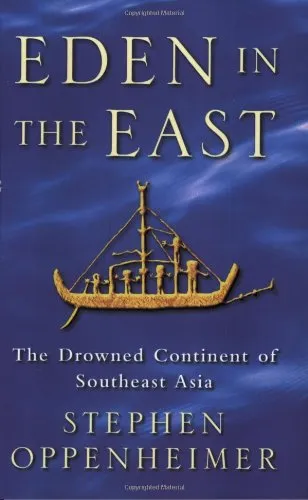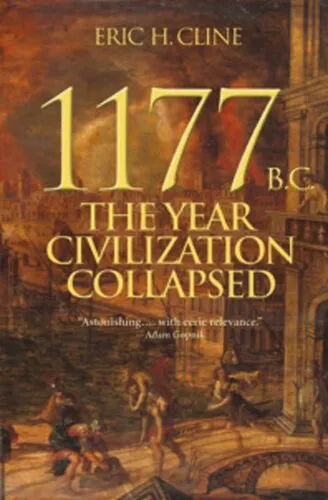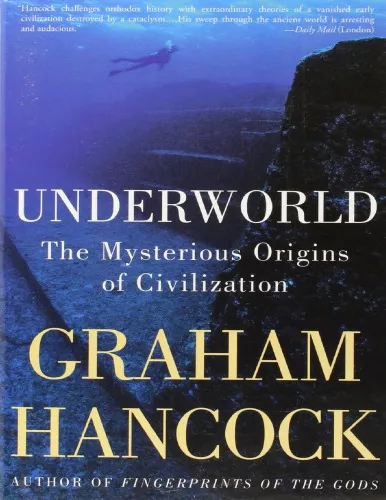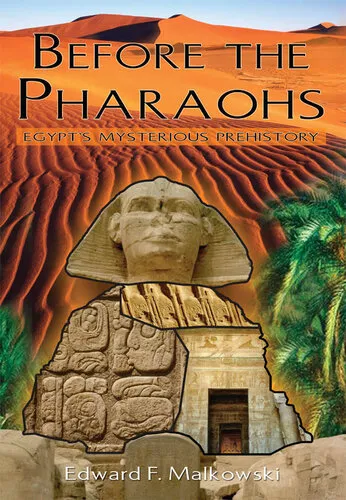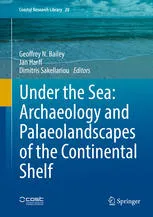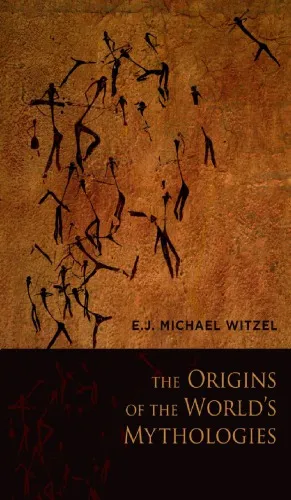Eden in the East: The Drowned Continent of Southeast Asia
4.0
بر اساس نظر کاربران

شما میتونید سوالاتتون در باره کتاب رو از هوش مصنوعیش بعد از ورود بپرسید
هر دانلود یا پرسش از هوش مصنوعی 2 امتیاز لازم دارد، برای بدست آوردن امتیاز رایگان، به صفحه ی راهنمای امتیازات سر بزنید و یک سری کار ارزشمند انجام بدینکتاب های مرتبط:
Persian Summary
معرفی کتاب 'Eden in the East: The Drowned Continent of Southeast Asia'
کتاب 'Eden in the East: The Drowned Continent of Southeast Asia' نوشته استیون اوپنهایمر، یک اثر جامع و جذاب است که به بررسی و تحلیل تاریخ و پیشزمینههای فرهنگی جنوبشرق آسیا میپردازد. اوپنهایمر با استفاده از یافتههای باستانشناسی، زبانشناسی و ژنتیک، نظریهای جدید درباره منشأ و توسعه تمدنهای اولیه در این منطقه ارائه میدهد. او ادعا میکند که تمدنهای اولیه در آسیای جنوبشرقی دارای تأثیرات عمیقی بر روی تمدنهای سراسر جهان بودهاند.
خلاصهای جامع از کتاب
این کتاب با جزئیات بسیار و استفاده از شواهد علمی متنوع، به بررسی تاریخی میپردازد که طی آن قارهای بزرگ در جنوبشرق آسیا در پایان آخرین عصر یخبندان، در نتیجه بالا آمدن سطح آبها، غرق شده است. این نظریه پیشنهاد میکند که این منطقه مهد اولیه تمدن بشری بوده و اثرات فرهنگ و تمدن آن به نقاط مختلف گسترده شده است. اوپنهایمر با تحلیل دادههای ژنتیکی و بررسی زبانهای باستانی به شناخت بهتر این تمدن کمک میکند و این باور تاریخی را به چالش میکشد که تمدنها فقط از خاورمیانه و اروپا سرچشمه گرفتهاند.
نکات کلیدی
- نظریه جدید درباره منشأ تمدنهای اولیه در جنوبشرق آسیا.
- استفاده از یافتههای ژنتیکی و زبانشناسی برای بررسی تاریخ بشر.
- تأثیرات فرهنگی و تکنولوژی این منطقه بر دیگر تمدنهای جهان.
- بازنگری در دیدگاههای سنتی درباره پیدایش تمدنها.
نقلقولهای معروف از کتاب
"برخی از قدیمیترین ریشههای تمدن جهانی در مکانهایی ظاهر میشوند که پیشتر ناشناخته بودند."
"آبی که قارههای قدیمی را در خود غرق کرد، همان است که تاریخ انسانی را احیا کرد."
اهمیت این کتاب
کتاب 'Eden in the East' یک پژوهش بنیادین است که به تغییری بزرگ در برداشت ما از تاریخ بشری و تقسیمات جغرافیایی منجر میشود. اهمیت این کتاب در این است که با استفاده از رویکردهای چندرشتهای و تحلیلهای نوین علمی، مدلهای جدیدی از توسعه و پیشرفت تمدنهای بشری ارائه میکند. تئوریهای اوپنهایمر نه تنها باعث پرسش از تصورات پیشین میشوند بلکه ابزاری جدید برای درک بهتر نحوه شکلگیری و تعامل فرهنگها ارائه میدهند. این کتاب به عنوان یک اثر ارزشمند برای پژوهشگران تاریخ، انسانشناسان و علاقهمندان به موضوعات فرهنگی و تاریخی، جایگاه ویژهای دارد.
Introduction to 'Eden in the East: The Drowned Continent of Southeast Asia'
Stephen Oppenheimer's groundbreaking book, 'Eden in the East: The Drowned Continent of Southeast Asia', challenges conventional perceptions of historical migrations and the cradle of civilization. This work offers an erudite exploration into the prehistoric influences of the Southeast Asian region, reimagining the origins of cultural and genetic threads that have woven societies together across the world.
Detailed Summary of the Book
The central premise of 'Eden in the East' posits that a highly advanced civilization once thrived in what is now the Southeast Asian region, which Oppenheimer identifies as a possible "Garden of Eden." This theoretical land, often submerged by rising sea levels at the end of the last Ice Age, purportedly influenced a wave of migration and cultural diffusion that shaped ancient societies across the globe.
Oppenheimer employs a multidisciplinary approach, incorporating archaeology, linguistics, genetics, and folklore to support his theory. Through extensive research, he argues that the dispersal of peoples from this drowned land may have significantly affected the development of key civilization areas in India, China, the Middle East, and beyond. The book challenges the traditional Eurocentric perspective of ancient civilization birthplaces by presenting compelling alternative narratives rooted in Southeast Asia.
The quest to uncover the roots of this theory takes readers on a captivating journey through myth and history. Oppenheimer reinterprets myths such as the Flood narratives prevalent across many cultures. He suggests these myths have a shared provenance in the real submergence of extensive lands in Southeast Asia, which dramatically altered human history.
In exploring these themes, Oppenheimer provides evidence that not only promotes a new understanding of cultural evolution but also enhances our grasp of human interconnectedness across continents.
Key Takeaways
- Reconsideration of Southeast Asia as a potentially critical origin of worldwide human migration and cultural dissemination.
- Integration of diverse research fields to form a cohesive argument against traditionally accepted theories.
- Highlighting the importance of geological and climatic events in shaping historical migrations and cultural transformation.
- Emphasis on the interconnectedness of ancient civilizations and recognition of shared stories and myths.
Famous Quotes from the Book
"The story of our origins lay not so much in the Mediterranean or Mesopotamian sunshine but beneath the endless rainclouds of Sunda."
"The features of the civilization we understand were forged not in the obscurity of deep time but amidst the turbulent waters of rising seas."
Why This Book Matters
'Eden in the East' matters because it challenges and potentially reshapes our comprehension of human prehistory and cultural evolution. In an age where history is constantly reevaluated through new lenses, this book exemplifies innovative thought rooted in scientific inquiry and bold hypothesis. By proposing that a "lost civilization" in Southeast Asia significantly influenced the world's ancient societies, Oppenheimer not only adds depth to our historical understanding but also emphasizes the dynamism and interconnectedness of human culture.
For readers and researchers interested in the fields of anthropology, history, genetics, and archaeology, 'Eden in the East' serves as a vital resource that encourages reflection on how we perceive and reconstruct human pasts. Additionally, it fosters appreciation for the contributions of often-overlooked regions and encourages global perspectives in examining history's intricate web.
دانلود رایگان مستقیم
شما میتونید سوالاتتون در باره کتاب رو از هوش مصنوعیش بعد از ورود بپرسید
دسترسی به کتابها از طریق پلتفرمهای قانونی و کتابخانههای عمومی نه تنها از حقوق نویسندگان و ناشران حمایت میکند، بلکه به پایداری فرهنگ کتابخوانی نیز کمک میرساند. پیش از دانلود، لحظهای به بررسی این گزینهها فکر کنید.
این کتاب رو در پلتفرم های دیگه ببینید
WorldCat به شما کمک میکنه تا کتاب ها رو در کتابخانه های سراسر دنیا پیدا کنید
امتیازها، نظرات تخصصی و صحبت ها درباره کتاب را در Goodreads ببینید
کتابهای کمیاب یا دست دوم را در AbeBooks پیدا کنید و بخرید
1582
بازدید4.0
امتیاز0
نظر98%
رضایتنظرات:
4.0
بر اساس 0 نظر کاربران
Questions & Answers
Ask questions about this book or help others by answering
No questions yet. Be the first to ask!
